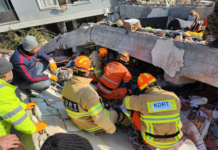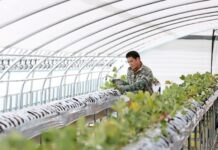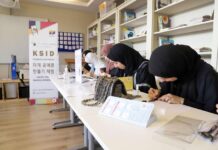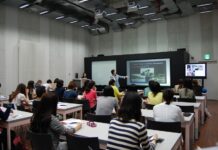| The world has been showing great interest in the upcoming 2018 Inter-Korean Summit. Media outlets from around the globe are covering stories related to the Korean Peninsula, visiting the Peace House in Panmunjeom, the summit venue, and the Demilitarized Zone, and holding interviews with people who have left their homes in the North. In line with this, Korea.net is meeting with diplomatic envoys to Seoul to learn more about their perspectives on the upcoming Inter-Korean Summit. |
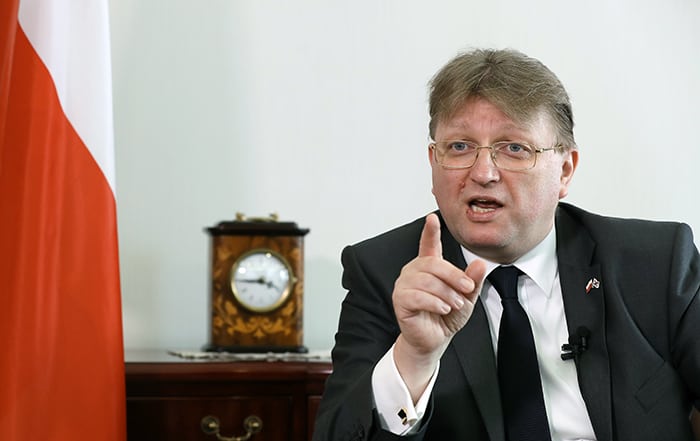
Polish Ambassador to Korea Piotr Ostaszewski says that the Inter-Korean Summit and the meeting between Washington and Pyeongyang go hand-in-hand. ‘We should wait for the results of both,’ he said.
By Lee Hana and Lee Yoonseo
Photos = Jeon Han
Video = Kim Sunjoo
Seoul | April 11, 2018
“Right now, the two Koreas are likely assessing their assets, as well as their advantages and disadvantages, in an effort to find the best choice that will achieve peaceful coexistence,” said Polish Ambassador to Korea Piotr Ostaszewski, comparing the upcoming 2018 Inter-Korean Summit to a game of chess.
“It’s important to note that we have more than just the two Koreas on this chess board. There are a total of six players: Korea, North Korea, the U.S., China, Russia and Japan. They each have interests in what’s going on here on the Korean Peninsula,” said the ambassador.
“The North Korean nuclear weapons issue is a concern for all the major players, but right now the key is in Seoul, in Washington, D.C., and in Pyeongyang.”
When the Korean Armistice Agreement was signed on July 27, 1953, declaring an armistice in the Korean War, a Neutral Nations Supervisory Commission (NNSC) was established to regulate relations between the two Koreas. Poland was chosen as one of the members of the NNSC, and carried out its duties as a neutral nation for several decades.
“No one could have predicted back in 1953 that this armistice agreement would go on to last more than 60 years. Now, the question is how to transform an armistice into a peace treaty,” said the ambassador.
“This question, and the matter of solving Pyeongyang’s nuclear weapons problem, extends to the Korean Peninsula and the world at large. A peaceful resolution to the issues surrounding the Korean Peninsula faces a very long horizon, and it will be a process that may take many years. For now, it’s best to wait for the results of the two summits,” he said.
Korea.net sat down with Ambassador Ostaszewski at the Polish Embassy in Seoul on April 11 to learn more about his take on the upcoming Inter-Korean Summit.
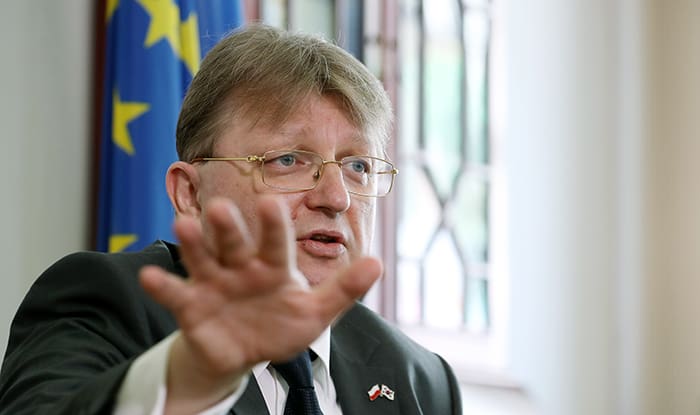
Polish Ambassador to Korea Piotr Ostaszewski says the 2018 Inter-Korea Summit may open the gate to a long process of peaceful coexistence.
-How did the Polish government react when the 2018 Inter-Korean Summit was announced?
Poland’s reaction has been very positive. Poland is a member of the U.N. and neutral nations are always ready to help. As a non-permanent member of the Security Council, Poland will be watching the summit closely, along with the international community.
-What expectations and prospects do you have for the upcoming summit?
We can expect the Inter-Korean Summit to open the gate to a long process of peaceful coexistence. This will be a result of some kind of treaty. Once this process is underway, we will need to think about denuclearization, as this is deeply connected to the establishment of peace.
How to settle the dispute is unpredictable from today’s standpoint, but it may become clearer after the U.S.’s negotiations with North Korea next month.
-Do you think the Inter-Korean Summit and Washington-Pyongyang summit go hand-in-hand?
Yes. The two summits should be thought of as two consecutive meetings and we should wait for the results of both. The first step is the summits, then a clarification of the term “denuclearization.” After that, the next step could be six-party talks.
-What is the top priority for the establishment of peace and denuclearization on the Korean Peninsula?
The upcoming summits are about a peace treaty and denuclearization. These are the expectations, at least. So the countries need to focus on what kind of peace treaty they have in mind because it will be a very long process, one that takes years.
The most important question is how to define the term “denuclearization.” If this means “absolute denuclearization,” we need to set up a verification mechanism. It’s a very tough issue.
-If you were to send a message of hope for the 2018 Inter-Korean Summit, what would it be?
First of all, I ask that people wait until the final results are announced. This extends to the international community.
As for President Moon Jae-in, who will be going into the summit, I wish him all the best. After June, we may be able to draw some conclusions.
hlee10@korea.kr



